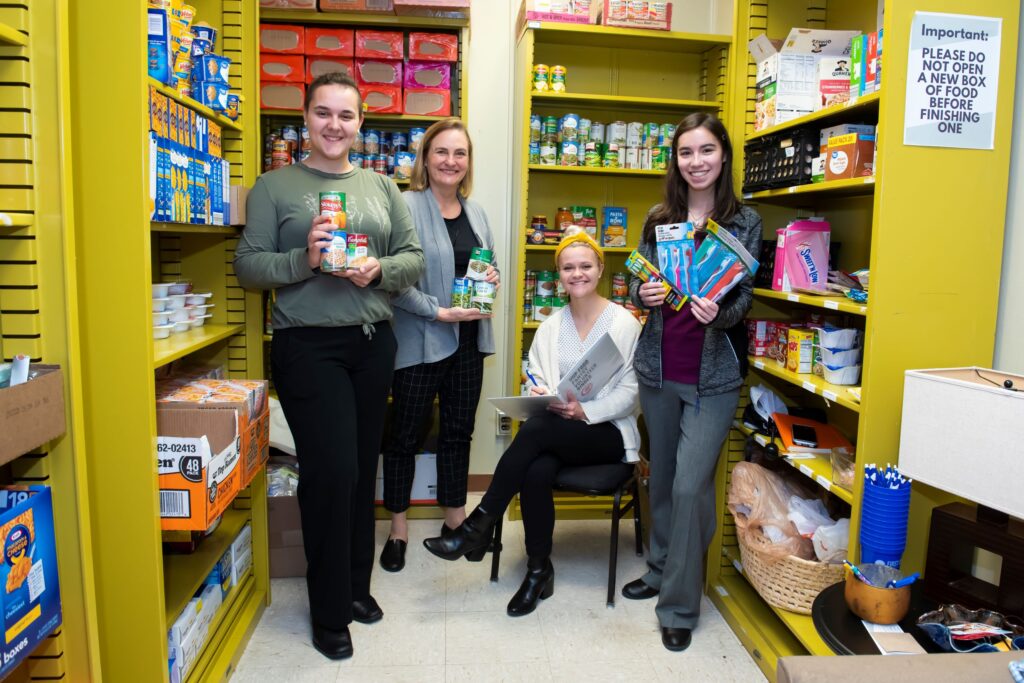
Photo by Frank C. Williams
By: Victoria Salters
The broke college student — it’s a common phrase that many young college students are all too familiar with. I remember when I was first moving into college, my mom made a joke about how I needed to be sure that I avoided eating too much junk food because “The freshman 15 doesn’t discriminate.” Little did I know that I would be met with an adverse problem. As college students navigate the uncharted territory of university life, they often encounter unexpected challenges. For many, the high cost of living and the cost of textbooks may present the greatest financial hurdles. However, for some students, simply obtaining their next meal can be a struggle. The issue of food insecurity on college campuses is both complex and pervasive yet, many people still aren’t familiar with or recognize the extent of the problem. Fortunately, at many universities across the country, we are seeing an emergence of resources aimed at combatting food insecurity on college campuses. Here at Auburn University at Montgomery (AUM) the Honors Program has a food pantry located on the second floor of the Taylor Center available to students.
In many ways hunger among college students is represented in a comical way by the media, some would even view it as a “rite of passage” for students. Because of the narratives surrounding the issue, having resources like the food pantry is incredibly important to both new and old students alike. In many cases, students are unaware of the existence of these resources, and even more struggle with food insecurity without ever seeking assistance.
One student, Logann Shorter, wishes she had known about the campus food pantry during her freshman year of college. Shorter is a graduating senior at AUM, and she didn’t learn about the food pantry until her second semester after she joined the Honors Program. After learning about the program, she became the chairperson and was responsible for stocking and facilitating events like the annual Donation-a-thon, which seeks to keep the pantry stocked. She states, “I happen to know because I am in the Honors Program, but outside of that there’s not a lot of media coverage around it being a resource to students which is terrible because many students here really need it.” According to a recent study by the Hope Center for College, Community, and Justice, nearly 50% of students attending four-year universities experience food insecurity. This statistic is concerning, but it is reassuring to know that many universities have programs in place to help alleviate this issue. The campus food pantry here at AUM is open to all students, regardless of their affiliation with the honors program. The issue of food insecurity can affect all college students, but students who don’t have access to food off campus feel the effects the hardest. Here at AUM, our cafeteria is only open on Monday to Thursday between the hours of 8 a.m. to 7 p.m. and on Fridays for a limited time. This leaves the whole weekend for students who live on campus without access to a hot meal. Most students go to local restaurants or cook on the weekends, but where does that leave students without a car? This issue includes many of our international students. According to Shorter, “The food pantry has a huge impact here on campus, especially for our international student population. Many of them would have a more difficult time getting access to items like food or hygiene products because many of them don’t have their own vehicles.” The pantry is stocked with non-perishable items, such as canned goods and cereal, as well as fresh produce and even products like soap and shampoo. The pantry is staffed by volunteers and is open during the school week to accommodate students’ schedules. Currently, each student is allowed to take a maximum of 5 food items from the pantry every day.
Many students here on campus come from a lower socioeconomic position. Despite this, college students who live on campus are routinely denied access to government assistance like (SNAP) Supplemental Nutrition Assistance Program. She went on to state that “There’s so many requirements around being eligible for SNAP, that we don’t get access to those, and the majority of students actually rely on their meal plan on campus, which they still have to pay for to have access to food and water. So many students are forced to go without.” Shorter went further and states “I kind of feel like, because students have access to school and they’re enrolled in these education courses, it’s assumed we must have access to funding. And so that idea around food insecurity isn’t really like attributed to students much. This isn’t a fair assumption though because many students are on Pell Grants, or come from single households, or some literally only have enough money to get here and nothing else. So we are solely reliant on our campus meal plans and those run out really fast.”
As students navigate the challenges of college life, it is important that they are aware of the resources available to them. In the case of food insecurity, the campus food pantry at AUM is an invaluable resource that can help ensure that students have access to nutritious food, regardless of their financial situation. The food pantry is always in need of donations. Just last week the annual Donation-a-thon just ended where clubs and organizations compete to donate canned goods to the food pantry. Everyone is welcome to donate to the food pantry at any time during the semester and donations are greatly appreciated.
